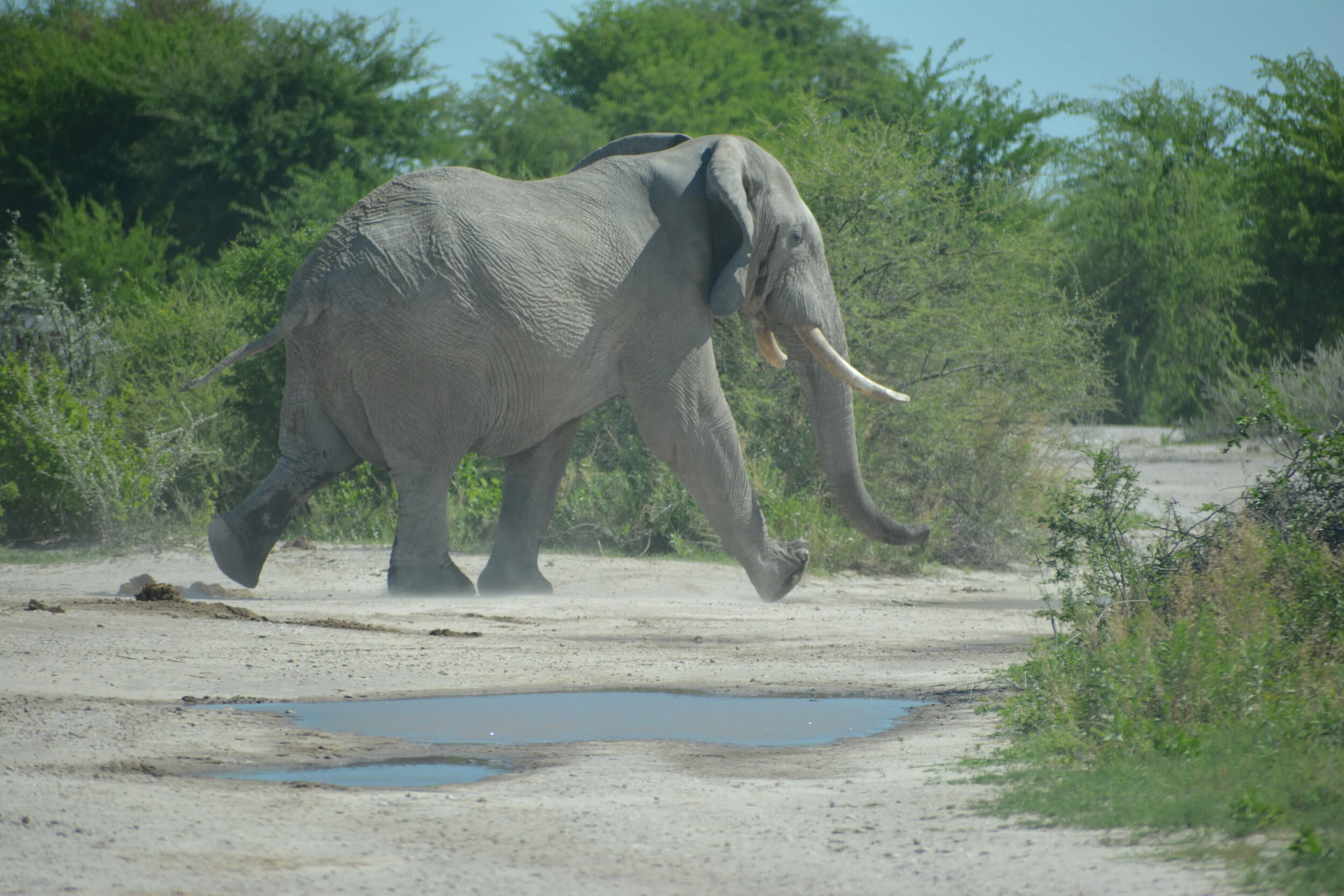The searing air blew in through the open windows of the Land Cruiser, tinged with dust whipped up from the dry track. So this is why they call it a pan, I thought: because it’s like driving through an oven. My attention snapped back to the watering hole as two aging bull elephants emerged from the bush to cool off with a drink. Deep in the Nxai Pan National Park the wildlife was waiting for the return of the rains.
100 degrees and nobody else around for miles in the expanse of Nxai Pan. Photo by Nicholas Bratton.
In December of 2019 I joined my wife and parents on a trip to Botswana and Zimbabwe, with passage through South Africa and brief forays into Zambia and Namibia. This was my first return visit to Botswana since my childhood. Zimbabwe I had been back to a couple times since I lived there, but not in years. This was my wife Jenna’s first time to Bots and Zim, although we’ve traveled together to other countries in Africa on three previous trips.
The first leg of our journey was based out of Maun. The last time I’d been there it was a dusty outpost on the edge of the Kalahari, a resupply point for overlanders venturing into the desert’s northern reaches. It was still dusty but much larger and extensively developed. We had one full day to explore before flying into the Okavango Delta and our plan was to make a day trip to Nxai Pan, a place none of us had been.
We had made arrangements to rent a 4x4 weeks in advance. Since Land Rovers are increasingly difficult to find in specialist rental fleets I sought out my second choice, a 76-Series Land Cruiser. With four-wheel drive, front/rear locking differentials, and a turbocharged diesel V8 engine, I was confident it would take us deep into the wilderness and bring us back – barring driver error.
Main gate to Nxai Pan National Park. Photo by Nicholas Bratton.
The paved two-lane highway from Maun to the park entrance was largely empty of traffic at 5:30am, although livestock wandered onto the road. From the office at the main gate we headed north along a track of deep, soft sand. The Land Cruiser had large, all-terrain tires that provided sufficient floatation, helped along by four-wheel drive and a locked rear differential. The tree-lined track didn’t afford much of a view and our chance encounters with wildlife were ground birds like guinea fowl and koorhan, or small antelope like duiker and steenbok.
Sliding around in the thick sand in the park en route to South Camp, no problem for the Land Cruiser. Photo by Michael Bratton.
A curious koorhan. Photo by Nicholas Bratton.
After about 45 minutes of sliding around in the deep sand the surface grew firmer, the vegetation opened up, and we rolled into South Camp. A chat with a ranger and review of a map painted on the outside wall of his office gave us a sense of a good route to explore most of Nxai Pan. Jenna drove so I could take photos. We set off on a clockwise loop and within minutes of leaving camp came across a pair of elephants at a watering hole.
What’s over there? Making a plan for the pan with a park warden. Photo by Michael Bratton.
Time to cool off in one of the handful of watering holes around Nxai Pan. Photo by Nicholas Bratton.
Deeper into the pan the landscape spread away and we were soon surrounded by wildlife, alone in the northern reaches of the park. We saw ostrich, zebra, impala, bustards, eagles, secretary bird, vultures, crested crane, giraffe, elephant, wildebeest, warthog, and hawks. I have lost track of all the parks I’ve been to in the years I’ve spent in Africa but this had to be one of the densest and most diverse arrays of wildlife I’ve seen. December was a great time to come. We had the entire place to ourselves.
Hello, there. Photo by Nicholas Bratton.
Lappet-faced vulture lounging by the pool. Photo by Nicholas Bratton.
Relaxation is the name of the game on the pan. Photo by Nicholas Bratton.
Elephants do not have efficient digestive systems, leaving easy pickings for this crested crane. Photo by Nicholas Bratton.
Our circuit of Nxai Pan was only a few hours but we could have spent days out there. It’s possible, as the park has a few remote camps out there. The trick to successful game viewing is not to drive around searching for the animals, but to find the right spot and wait for the animals to come to you. Amongst the acacia trees, termite mounds, and perfectly flat sea of grass one could easily watch in rapture as the wildlife wandered around you. Unfortunately we had to leave this beautiful expanse behind us and head back south through the thick sand to reach our second destination for the day: Kudiakam Pan.
The sense of space is difficult to convey in a picture, but the impala are glad to have it. Photo by Nicholas Bratton.




